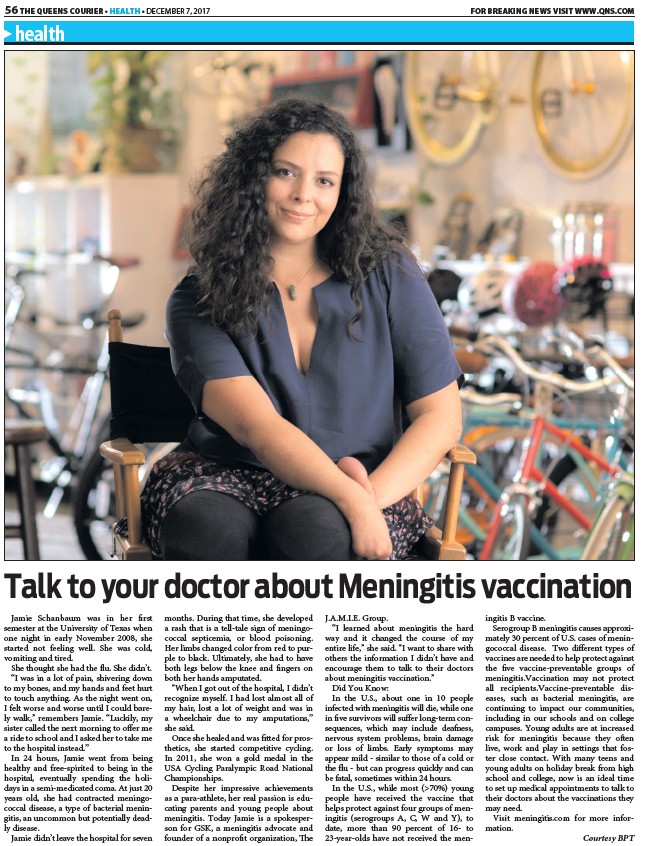
56 THE QUEENS COURIER • HEALTH • DECEMBER 7, 2017 FOR BREAKING NEWS VISIT WWW.QNS.COM
health
Talk to your doctor about Meningitis vaccination
Jamie Schanbaum was in her fi rst
semester at the University of Texas when
one night in early November 2008, she
started not feeling well. She was cold,
vomiting and tired.
She thought she had the fl u. She didn’t.
“I was in a lot of pain, shivering down
to my bones, and my hands and feet hurt
to touch anything. As the night went on,
I felt worse and worse until I could barely
walk,” remembers Jamie. “Luckily, my
sister called the next morning to off er me
a ride to school and I asked her to take me
to the hospital instead.”
In 24 hours, Jamie went from being
healthy and free-spirited to being in the
hospital, eventually spending the holidays
in a semi-medicated coma. At just 20
years old, she had contracted meningococcal
disease, a type of bacterial meningitis,
an uncommon but potentially deadly
disease.
Jamie didn’t leave the hospital for seven
months. During that time, she developed
a rash that is a tell-tale sign of meningococcal
septicemia, or blood poisoning.
Her limbs changed color from red to purple
to black. Ultimately, she had to have
both legs below the knee and fi ngers on
both her hands amputated.
“When I got out of the hospital, I didn’t
recognize myself. I had lost almost all of
my hair, lost a lot of weight and was in
a wheelchair due to my amputations,”
she said.
Once she healed and was fi tted for prosthetics,
she started competitive cycling.
In 2011, she won a gold medal in the
USA Cycling Paralympic Road National
Championships.
Despite her impressive achievements
as a para-athlete, her real passion is educating
parents and young people about
meningitis. Today Jamie is a spokesperson
for GSK, a meningitis advocate and
founder of a nonprofi t organization, Th e
J.A.M.I.E. Group.
“I learned about meningitis the hard
way and it changed the course of my
entire life,” she said. “I want to share with
others the information I didn’t have and
encourage them to talk to their doctors
about meningitis vaccination.”
Did You Know:
In the U.S., about one in 10 people
infected with meningitis will die, while one
in fi ve survivors will suff er long-term consequences,
which may include deafness,
nervous system problems, brain damage
or loss of limbs. Early symptoms may
appear mild - similar to those of a cold or
the fl u - but can progress quickly and can
be fatal, sometimes within 24 hours.
In the U.S., while most (>70%) young
people have received the vaccine that
helps protect against four groups of meningitis
(serogroups A, C, W and Y), to
date, more than 90 percent of 16- to
23-year-olds have not received the meningitis
B vaccine.
Serogroup B meningitis causes approximately
30 percent of U.S. cases of meningococcal
disease. Two diff erent types of
vaccines are needed to help protect against
the fi ve vaccine-preventable groups of
meningitis.Vaccination may not protect
all recipients.Vaccine-preventable diseases,
such as bacterial meningitis, are
continuing to impact our communities,
including in our schools and on college
campuses. Young adults are at increased
risk for meningitis because they oft en
live, work and play in settings that foster
close contact. With many teens and
young adults on holiday break from high
school and college, now is an ideal time
to set up medical appointments to talk to
their doctors about the vaccinations they
may need.
Visit meningitis.com for more information.
Courtesy BPT